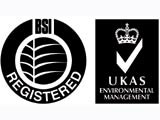Make your benchmark
The ISO system – a valuable measure of efficiency in manufacturing industries – is now being applied to creative industries. Danny Coyle outlines the benefits

Ask most people in design or marketing agencies what ISO is and the chances are you’ll either be told it’s an obscure Japanese soft drink or, more often than not, you’ll be given a blank look.
The International Organisation for Standardisation is the world’s largest developer of standards and increasingly, as more and more clients demand evidence of quality assurance, some of these standards are having an impact on the way consultancies manage their processes.
At Imagination we’ve long recognised the value and importance of offering our clients the highest quality work and are committed to benchmarking our performance against the highest standards. That’s why, for the past three years, we’ve been implementing, adapting and evolving systems across the group to produce a consistent quality of services that ultimately enables us to deliver better value to our clients.
This value has most recently been recognised by Imagination client Ford, which awarded the group its prestigious Q1 quality assessment – the first time a European marketing services supplier has been honoured in this way. This latest registration follows the consultancy achieving the ISO9001 standard in 2002 (Quality Management) and ISO14001 (Environmental Management) in 2003.
While Q1 status is only applicable to Ford suppliers, ISO standards are open to any company. But I believe that companies interested in achieving these quality processes should be fully aware of what they really entail.
As Imagination’s business system manager, I’ve been responsible for planning and implementing these processes. As well as time spent setting up these systems, there are the cost implications. Luckily, Imagination realises that the cost-savings the group has already made by making itself more efficient have been beneficial. And, more fundamentally, we believe that because of the way the markets are changing, the cost of not doing so is even greater.
The ISO system encourages you to ask searching questions about how and why things are done in your company and as such I have found that you need support from the highest level – and a thick skin – as it may mean changing or sometimes scrapping deeply entrenched processes.
One of the most important lessons I’ve learnt is that the company has to buy into the mindset of the process from an early stage. The standards aren’t about bureaucracy and levels of detail. They’re about making the system work better. The sooner you show people how the changes will benefit them (no matter what department they’re in), the smoother the implementation will be.
In some cases, I found that many of our existing systems could be retained and changed with only a slight tweak. Obviously, they need to meet the requirements of the standard, but most importantly they need to work for the company.
With regard to the ISO auditors (who visit the company on a six-monthly check-up basis), I found that most have manufacturing or engineering backgrounds and don’t always know much about auditing creative industries. Trying to make them understand the way you work can prove to be difficult. But if you’re sure that your processes meet the requirements of the system, stand your ground – they’re much more flexible than many would have you believe.
Having worked on the systems for more than three years now, it’s not only clear that it is fast becoming a business requisite, becoming ISO-certified also makes good business sense. It develops your processes to help you become more consistent. You begin looking at the value you’re adding to each and every process and that’s as vital a part of your offer as the creative work you produce.
Danny Coyle is business system manager at Imagination
-
Post a comment



